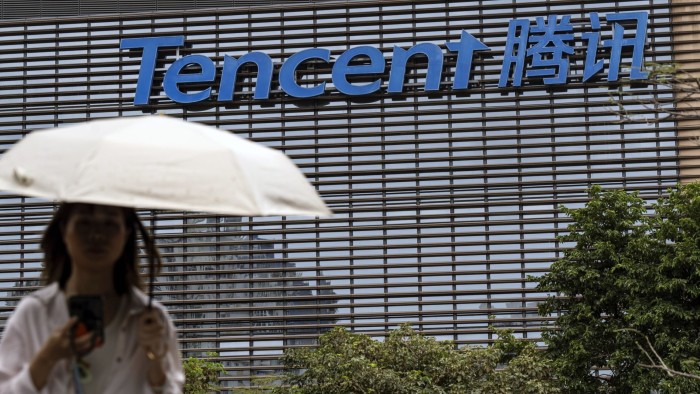Unlock the Editor’s Digest for free
Roula Khalaf, Editor of the FT, selects her favourite stories in this weekly newsletter.
Tencent’s US-listed shares fell as much as 9.8 per cent after the Pentagon designated the tech giant as a Chinese military company operating in the US.
The gaming and social media group, which owns ubiquitous Chinese messaging app WeChat, was added to a list of dozens of companies the defence department considers to be working with the Chinese military directly or indirectly, according to a federal document published on Monday.
The list is part of Washington’s broad efforts to counteract the rise of China as a military superpower.
The Pentagon has described the list as a way to highlight and counter what it calls China’s “military-civil fusion strategy”, which bolsters the Chinese military’s modernisation efforts by ensuring it can acquire advanced technology from Chinese companies, universities and research programmes that are masked as civilian entities.
The US has imposed multiple rounds of sweeping export controls designed to curtail China’s ability to make an advanced semiconductor industry and make it more difficult for Beijing to develop artificial intelligence for military use.
In retaliation, Beijing has been tightening its own export controls. Last month it banned shipments to the US of certain minerals and metals used in semiconductor manufacturing and military hardware.
Being added to the Pentagon’s Chinese military companies blacklist has no direct legal ramifications and does not result in sanctions. However, it does carry reputational risks.
Tencent’s addition to the list “is clearly a mistake”, a company spokesperson said.
“We are not a military company or supplier. Unlike sanctions or export controls, this listing has no impact on our business. We will nonetheless work with the Department of Defense to address any misunderstanding,” the spokesperson added.
Tencent’s US-traded American depositary receipts were down about 8 per cent on Monday, after falling as much as 9.8 per cent earlier following the news.
CATL, the world’s biggest battery maker, was also added to the Pentagon’s list. The manufacturer, which is an important supplier to electric-vehicle maker Tesla, has a global EV battery market share of about 38 per cent.
CATL has been working with Tesla and Ford to license its battery manufacturing technology for factories in the US.
The company did not immediately respond to a request for comment.
Chip manufacturer Changxin Memory Technologies, drone-maker Autel Robotics and IT equipment maker Quectel Wireless were also added to the list.
Beginning next year, companies on the list will not be able to do business with the Pentagon, potentially affecting those that are in the defence supply chain.
The Pentagon will not be able to contract companies on the list beginning in June 2026, and from 2027 will not be able to procure goods or services that include the listed companies in their supply chains.
Source link









